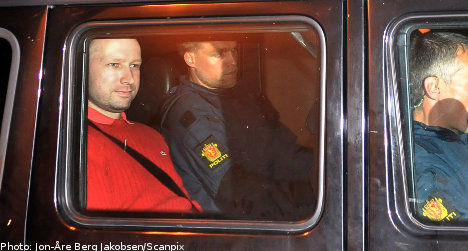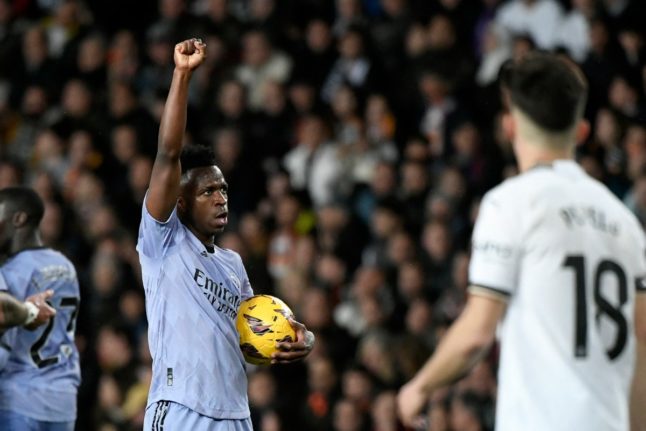While his acts are beyond conventional politics, self-confessed Norwegian mass killer Anders Behring Breivik, a man proud of his Viking roots, has been influenced by the far-right ideology that has risen over the last 15 years.
Behring Breivik told Monday’s closed-door court hearing that he wanted his attacks that killed 76 to send a strong signal to the left-wing Norwegian government to stop “the deconstruction of Nordic culture and the mass importing of Muslims.”
“Breivik is of course alone in his extremism, in his crimes,” the head of Oslo’s anti-racism centre Kari Helene Partapuoli told AFP.
“But it’s also interesting to see that he evolved in a certain socio-political context, that this shooting spree is not a coincidence. He hasn’t come from a vacuum.”
The populist right-wing Norwegian Progress Party “has been very talented at steering the public debate” including by stigmatising Muslims and foreigners, she says.
There were almost no non-Europeans communities in Nordic countries until the 1970s and 80s, but since then they have become home to hundreds of thousands who fled conflict zones such as the former Yugoslavia, Somalia or Kurdistan.
Sweden has for instance welcomed more refugees from Iraq after the 2003 US-led invasion than all the big European nations combined, according to the Swedish Migration Authority.
In Oslo, the most common first name given to babies in 2010 was Mohammed.
The proportion of people born abroad is now over 10 percent in Sweden and Norway and around eight percent in Denmark. In Oslo that rises to 27 percent
and over 80 percent in certain Swedish suburbs, according to official estimates.
Having started in Denmark at the end of the 1990s, the rise of the populist and anti-immigration right seemed to be unstoppable.
“But the feeling of xenophobia didn’t increase, on the contrary it sometimes went down, it’s more like a crafty political use has been made of it,” said Ulf Bjereld, political scientist at Sweden’s Gothenburg University.
The Norwegian Progress Party, of which Behring Breivik was a member for several years until he left because he found it too moderate, has become the second biggest party with 23 percent of the vote in the last elections.
The party’s leader Siv Jensen has made “rampant Islamisation” one of her favourite bugbears.
In Denmark, a minority liberal-conservative government has since 2001 needed the support in parliament of the Danish People’s Party, giving the right-wing group an ideal launchpad for its ideas.
The Swedish Democrats party (slogan: “Keep Sweden Swedish”) got into parliament in September, causing a political earthquake that was repeated seven months later in Finland when the “True Finns” got 19 percent of the vote.
The Nordic far-right is now so entrenched in the political establishment that experts say the “extreme” label is no longer suitable.
“They’re established, they’re now part of the mainstream,” Anders Hellström, a Swedish specialist in nationalist and populist movements, told AFP recently.
However, the radical fringe of the extreme right is “scattered, without real structure,” said French Scandinavia expert Cyril Coulet.
“In Norway, there are people linked to social networks, small groups of skinheads who carry out attacks on foreigners, like elsewhere in Scandinavia,” he said.A far-right that vaunts anti-immigration, Islamophobia and the welfare state has taken hold in Nordic countries, playing on the fears of societies that are less and less blond and blue eyed, AFP’s Marc Preel writes.
While his acts are beyond conventional politics, self-confessed Norwegian mass killer Anders Behring Breivik, a man proud of his Viking roots, has been influenced by the far-right ideology that has risen over the last 15 years.
Behring Breivik told Monday’s closed-door court hearing that he wanted his attacks that killed 76 to send a strong signal to the left-wing Norwegian government to stop “the deconstruction of Nordic culture and the mass importing of Muslims.”
“Breivik is of course alone in his extremism, in his crimes,” the head of Oslo’s anti-racism centre Kari Helene Partapuoli told AFP.
“But it’s also interesting to see that he evolved in a certain socio-political context, that this shooting spree is not a coincidence. He hasn’t come from a vacuum.”
The populist right-wing Norwegian Progress Party “has been very talented at steering the public debate” including by stigmatising Muslims and foreigners, she says.
There were almost no non-Europeans communities in Nordic countries until the 1970s and 80s, but since then they have become home to hundreds of thousands who fled conflict zones such as the former Yugoslavia, Somalia or Kurdistan.
Sweden has for instance welcomed more refugees from Iraq after the 2003 US-led invasion than all the big European nations combined, according to the Swedish Migration Authority.
In Oslo, the most common first name given to babies in 2010 was Mohammed.
The proportion of people born abroad is now over 10 percent in Sweden and Norway and around eight percent in Denmark. In Oslo that rises to 27 percent
and over 80 percent in certain Swedish suburbs, according to official estimates.
Having started in Denmark at the end of the 1990s, the rise of the populist and anti-immigration right seemed to be unstoppable.
“But the feeling of xenophobia didn’t increase, on the contrary it sometimes went down, it’s more like a crafty political use has been made of it,” said Ulf Bjereld, political scientist at Sweden’s Gothenburg University.
The Norwegian Progress Party, of which Behring Breivik was a member for several years until he left because he found it too moderate, has become the second biggest party with 23 percent of the vote in the last elections.
The party’s leader Siv Jensen has made “rampant Islamisation” one of her favourite bugbears.
In Denmark, a minority liberal-conservative government has since 2001 needed the support in parliament of the Danish People’s Party, giving the right-wing group an ideal launchpad for its ideas.
The Swedish Democrats party (slogan: “Keep Sweden Swedish”) got into parliament in September, causing a political earthquake that was repeated seven months later in Finland when the “True Finns” got 19 percent of the vote.
The Nordic far-right is now so entrenched in the political establishment that experts say the “extreme” label is no longer suitable.
“They’re established, they’re now part of the mainstream,” Anders Hellström, a Swedish specialist in nationalist and populist movements, told AFP recently.
However, the radical fringe of the extreme right is “scattered, without real structure,” said French Scandinavia expert Cyril Coulet.
“In Norway, there are people linked to social networks, small groups of skinheads who carry out attacks on foreigners, like elsewhere in Scandinavia,” he said.



 Please whitelist us to continue reading.
Please whitelist us to continue reading.
Member comments